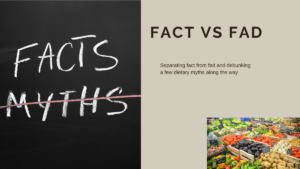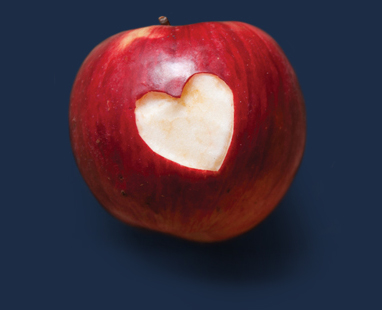Separating Fact from Fad
Debunking common nutritional myths

In my ongoing quest to discover how we can age healthier, I’ve encountered plenty of, well, nutritional nonsense. My practice is based on helping you navigate through these myths and share the solid science of what truly benefits our health.
No doubt about it, the wide world of nutrition can be confusing, especially with so many diets claiming to be the best. Whether it’s keto, raw, paleo, or avoiding soy and lectins due to anti-nutrients, it’s more important than ever to understand what works for your unique self. Listen to your body and pay attention to how different foods make you feel. What works for one person might not work for another, and that’s okay.
I’m a big believer in fuelling our bodies with a variety of whole, unprocessed foods and thoroughly enjoying what you eat. Finding a balanced approach that suits your individual needs and lifestyle is key – personalized nutrition! So let’s dig in.
The Nightshade Debate
Friend or Foe?
Nightshades are a group of plants that includes tomatoes, peppers, eggplants, and potatoes. These vegetables are often surrounded by controversy in the nutrition world due to the presence of alkaloids, which some believe can cause inflammation or other health issues.
Fact vs. Fiction:
While it’s true that nightshades contain alkaloids, for most people, these vegetables are perfectly safe and incredibly nutritious. They provide a wealth of vitamins, minerals, and antioxidants. Tomatoes are rich in lycopene, which has potent cancer-fighting properties and are especially protective against skin and ovarian cancer.
Who Should Be Cautious?
If you have an autoimmune condition or are particularly sensitive to nightshades, you might experience some adverse effects like joint pain or digestive discomfort. In such cases, it might be worth experimenting with reducing or eliminating nightshades from your diet to see if your symptoms improve.
Cooking to Reduce Alkaloids:
Cooking nightshades can help reduce their alkaloid content, making them easier to digest for those who are sensitive. So, if you’re concerned but don’t want to give up these nutritious foods, try roasting, baking, or steaming them.
The Lectin Issue
Are they really villains?
Lectins are another hot topic in nutrition circles lately, often portrayed as villains in our diet. Found in a variety of foods including legumes, grains, and nightshades, lectins are a type of protein that can bind to carbohydrates. But are they really as harmful as some suggest?
Lectins are naturally occurring proteins that plants produce as a defense mechanism against pests. While high amounts of certain raw lectins can be toxic, most foods we consume are either cooked or processed in ways that significantly reduce their lectin content.
The Benefits
Contrary to the negative hype, many lectin-containing foods are incredibly nutritious and offer numerous health benefits:
- Legumes and Lentils Packed with protein, fiber, vitamins, and minerals, they support heart health and help manage blood sugar levels.
- Whole Grains Provide essential nutrients and are a great source of energy. They also support digestive health.
- Tomatoes As well as being part of the nightshade family, they also fall under the lectin containing group. They are rich in antioxidants like lycopene, which has been shown to reduce the risk of certain cancers and support skin health.
Reducing Lectins in Your Diet
If you’re concerned about lectins, there are simple ways to reduce their presence in your food:
- Cooking Boiling, steaming, or pressure cooking can significantly lower lectin levels.
- Soaking Soaking beans and legumes before cooking can reduce lectins and enhance digestibility.
- Fermentation Fermented foods like tempeh can have reduced lectin content and they offer a boost of probiotic benefits.
Should You Avoid Lectins?
For most people, lectins in their diet pose no significant health risks, especially when foods are properly prepared. However, if you have specific health issues like irritable bowel syndrome (IBS) or autoimmune conditions, you might find that reducing lectin intake helps manage your symptoms.
The Cabbage Family
And Your Thyroid
Cabbage, kale, cauliflower, broccoli and Brussels sprouts belong to a family of vegetables known as cruciferous vegetables. These nutritious powerhouses contain compounds called goitrogens, which can interfere with iodine uptake by the thyroid gland. Iodine is essential for thyroid function, so it’s understandable why there might be concerns about these veggies.
The Real Impact
In reality, you’d need to consume a very large amount of these vegetables—around 5 pounds of kale or 10 cups of raw Brussels sprouts daily—to have any impact on your thyroid. It’s unlikely you’ll eat anywhere near that amount.
Cooking Reduces Goitrogens
The good news is that cooking these vegetables significantly reduces their goitrogen content. So, enjoying cooked cabbage, kale, and Brussels sprouts is both safe and beneficial. Even when consumed raw in moderate amounts, they offer an array of health benefits, including vitamins, minerals, and fiber.
Why Include Them in Your Diet?
Cruciferous vegetables are known for their cancer-fighting properties. They contain compounds like sulforaphane, which has been shown to help prevent cancer cell growth. Additionally, these vegetables support liver detoxification and provide antioxidants that promote overall health.
A Balanced Approach
As with all aspects of nutrition, balance is key. There’s no need to cut back on these nutritious vegetables out of fear of goitrogens. Instead, enjoy them as part of a varied and balanced diet. Your body will benefit from the wide range of nutrients they offer.
Listen to Your Body
If you have a thyroid condition or are concerned about goitrogens, listen to your body and consult with a healthcare provider. They can provide personalized advice based on your individual health needs.
The Power of Real Food
Despite the nutritional nonsense we’ve all heard over the years, one thing remain clear…our bodies function and feel best when fuelled by real food, not food-like products.
By choosing whole, unprocessed foods we’re letting Mother Nature’s pharmacy – farmacy – work its magic!


